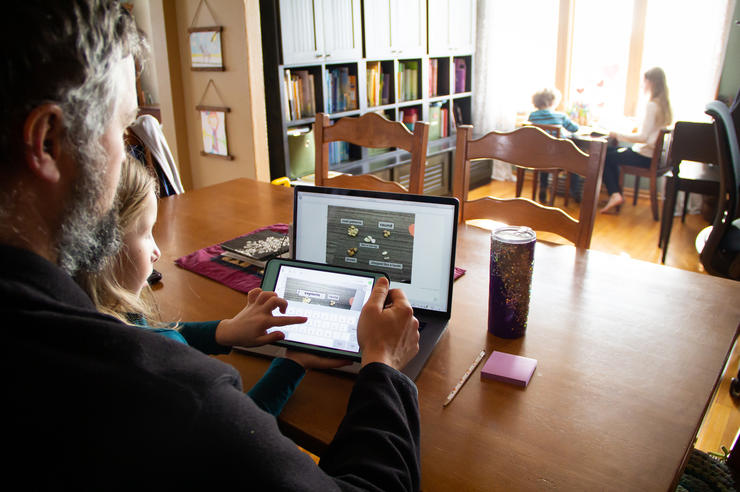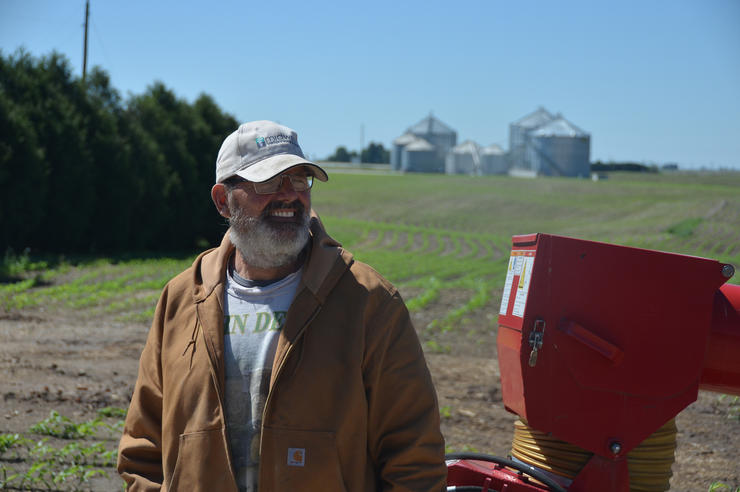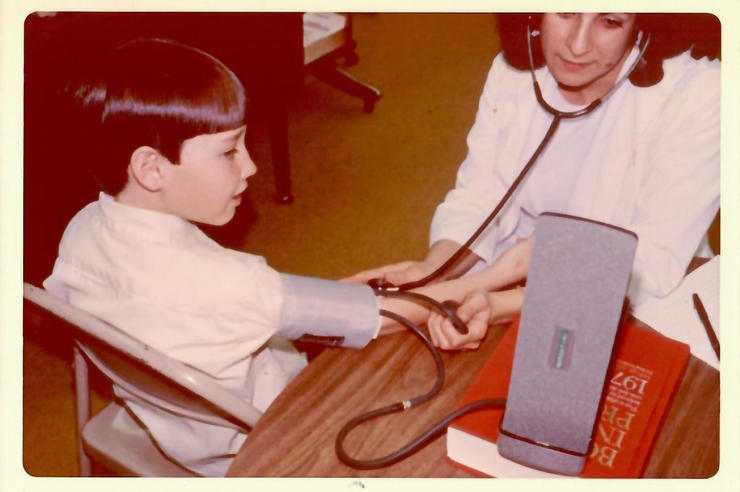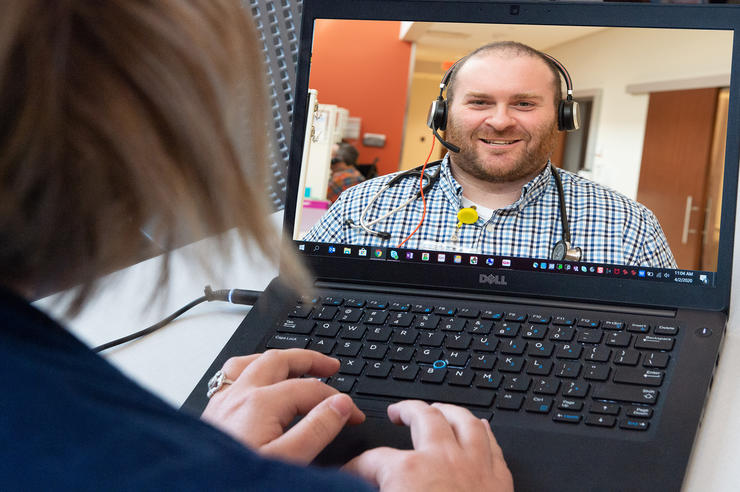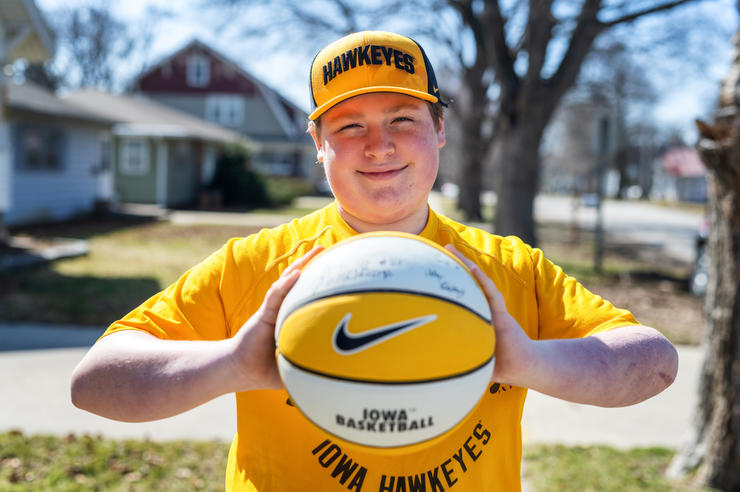Free service helps Iowa children with reading disabilities
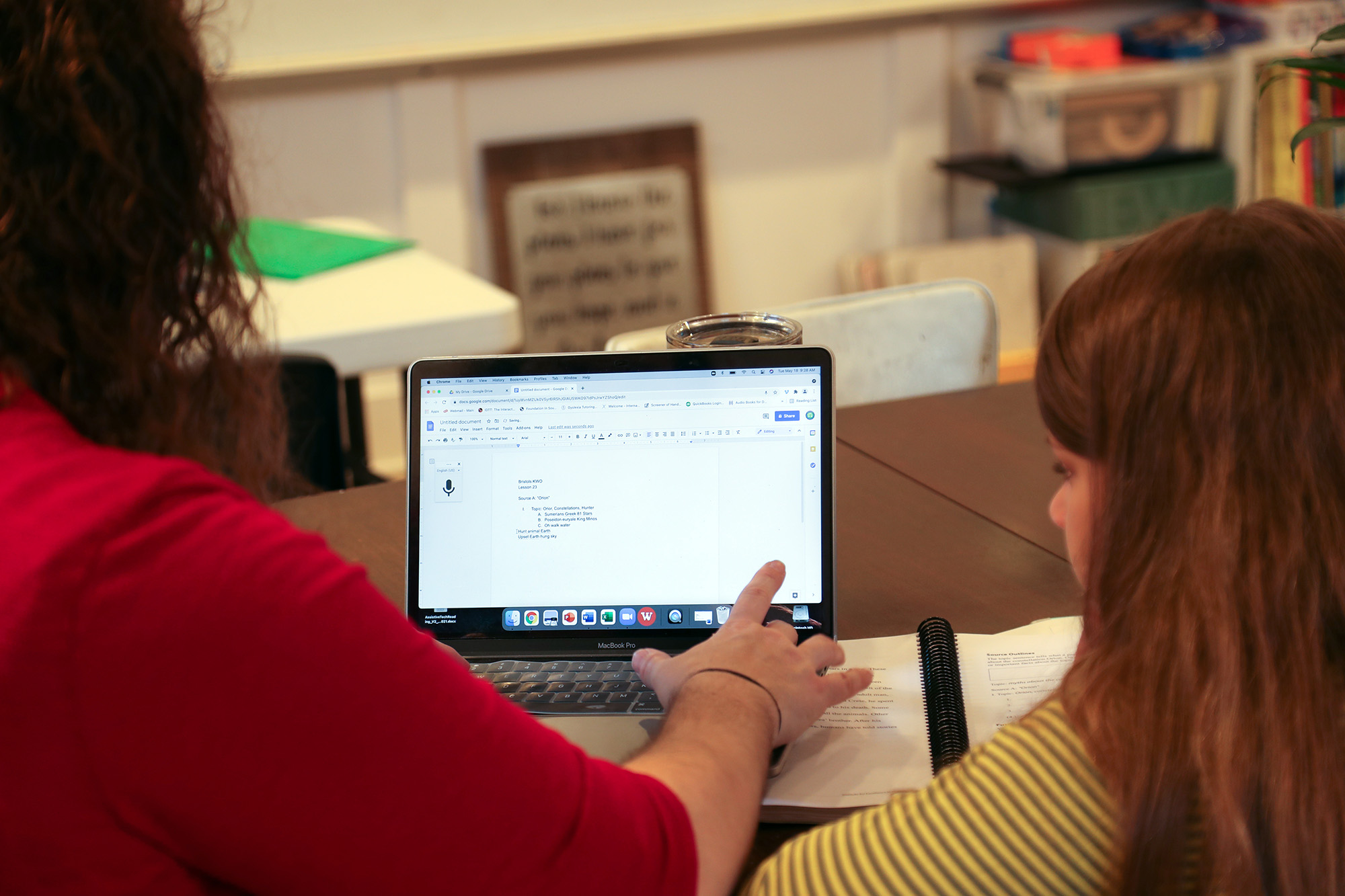
Mindy VanZuiden knows firsthand the challenges and frustrations of growing up with a reading disability. When her youngest two children began exhibiting similar difficulties, she was determined that they not struggle like she, her sister, and her mother did.
During a training session through the Mid-Prairie Home School Assistance Program, VanZuiden learned about dyslexia.
“My jaw hit the ground because in an instant I knew I was dyslexic and so were two of my kiddos,” VanZuiden says. “So, over the course of the past three years, I have been doing everything in my power to learn about dyslexia and learn how to support my children with dyslexia.”
The Williamsburg, Iowa, family found a key support in the Iowa Reading Research Center (IRRC) at the University of Iowa, which offers free assistive-technology consultations for Iowa families of children with dyslexia and other reading disabilities.
“This is exactly the service that parents are looking for and exactly the service that students need,” says VanZuiden, a former public-school teacher who owns a tutoring business and specializes in helping students with reading difficulties. “These students don’t have a way to show you what they know or a way to access the information that you’re sharing with them. Assistive technology allows students to access what they have in their brains and share it. It levels the playing field.”
The Iowa Reading Research Center at the University of Iowa offers free assistive technology consultations for Iowa families of children with dyslexia and other reading and writing disabilities. These one-on-one in-person or virtual appointments are tailored to demonstrate devices and programs that address each child’s unique needs.
Examples of assistive technology for reading:
- Audiobooks
- Text-to-speech software, which reads digital text aloud
- Optical character recognition, which reads aloud text from images or scanned documents
- Speech-to-text software, which converts what a person says to written text
- Word prediction software, which can suggest a word as a person types
- Display control to allow people to change the font, font size, color, and spacing of text, or mask parts of the screen to lessen distractions while reading
- Smart pens that allow a person to take notes while also recording what is being said
The IRRC began offering assistance in 2019 after a center with a similar service closed. Deborah Reed, director of the IRRC, says the timing was perfect as the center was beginning to take on a bigger role supporting dyslexia education in the state.
“All parents want their children to be successful,” Reed says. “Dyslexia and other reading disabilities affect so many families, and there’s a lot of emotion usually wrapped up in the issue because of how frustrating it is for kids—and adults as well. Assistive technology can support learning and help teachers see how much students know and can do if it weren’t for this particular limitation.”
So far, families in 23 Iowa communities have taken advantage of the consultations.
The goal of the free consultations, which can be done in person or virtually, is to introduce parents and children to assistive technology that may help with their unique needs. Children do not need to have been diagnosed with a reading disability or have an Individualized Education Program (IEP) or 504 plan (a formal plan developed by schools for students with disabilities) to take advantage of the service.
The center’s assistive technology coordinator, Karah Kluck, is a second-year student working toward a BA in communication sciences and disorders who was hired in 2019 by the center to help get the consultation program up and running. She and another student researched and tested dozens of assistive technology options, developed demonstrations, and created handouts explaining each technology’s specific features for families to take home with them.
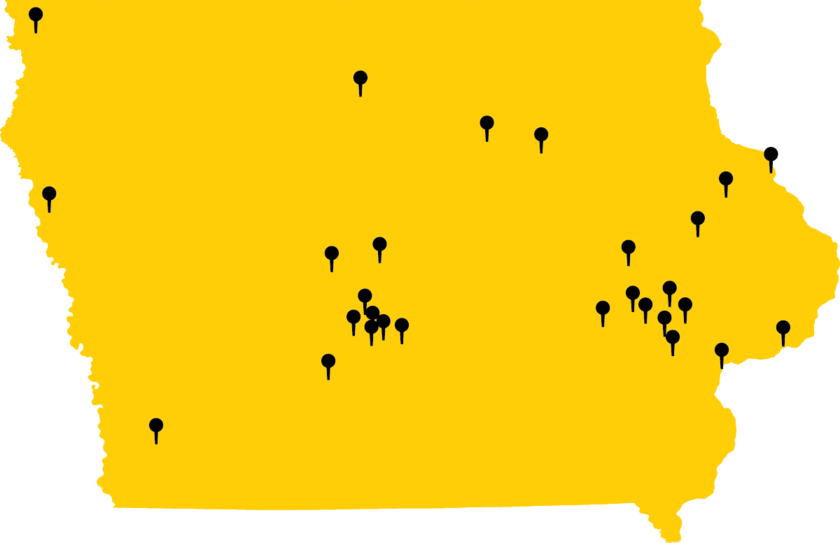
The Iowa Reading Research Center has provided assistive-technology consultations for families in the following Iowa communities:
- Ames
- Cedar Rapids
- Clive
- Coralville
- Davenport
- Des Moines
- Doon
- Dumont
- Dyersville
- Emerson
- Iowa City
- Janesville
- Johnston
- Kanawha
- Lone Tree
- Monticello
- Muscatine
- North Liberty
- Ogden
- Sergeant Bluff
- Solon
- Urbandale
- Waukee
- West Branch
- West Des Moines
- Williamsburg
- Winterset
Along with facilitating the consultations, Kluck keeps up to date on both new technology and new features on current technology, adjusting demonstrations and documentation as necessary to make sure families have the most current information possible.
“There’s so much out there and it moves at a breakneck speed,” Kluck says. “One of the main struggles is that families just don’t know what’s available. We provide a stepping stone for them to put their toes in the water and learn a little bit about what’s out there. It’s always great when I start showing them something and they say, ‘Oh my gosh, this is so amazing.’ Assistive technology can have such a big impact on students’ academic and social lives, and just quality of life in general, and so the fact that I even get to play a small little part of that is super rewarding.”
VanZuiden appreciates that she only needed to schedule one appointment and that Kluck tailored the consultation to address each of her kids’ unique needs. She says Ryder, 7, has a dyslexia diagnosis and needs a little more assistance with reading and getting information from text. Meanwhile, Bristol, 10, is more capable of reading but struggles with dysgraphia and needs extra support with handwriting.
“It was a bit like drinking from a fire hydrant, there was so much information,” VanZuiden says. “We asked lots of questions, tinkered with things, and got to experiment with different programs. She had things set up so that the kids could participate as well. Bristol, especially, you could see her eyes light up trying some of the programs. I felt like we walked away with more than one option for both children.”
Kluck says the most popular assistive technology functions are text-to-speech and speech-to-text, along with word prediction and the ability to change visual aspects of what’s being read.
Families also are able to check out an assistive device for a short period of time, allowing them to try using it at home.
“This way, the child gets a fair shot with it to see if they like it and if it works for them,” Kluck says. “This is especially important if they need to purchase a device or software package.”

“It’s a huge sigh of relief as a parent to know that my children are supported and have the technology that they need to show the world what they know.”
VanZuiden says one other aspect of the assistive technology consultation was particularly valuable.
“The fact that this is free is so critical these days, when life is hard and financially stressful,” VanZuiden says. “It seems like everything to help dyslexic students these days costs parents out of their pocket. It’s unfortunate that we don’t offer everything free to these children.”
Reed says free services in general are rare, but it’s especially rare for a university-based reading research center to offer such free outreach to families.
The IRRC service isn’t a substitute for the services provided by school districts, area education agencies, or other programs, Reed says, but instead a supplement and at times a connection to them. The consultations also do not include an evaluation of a child’s reading or writing abilities or provide a diagnosis of a learning disability.
It’s important that people understand what assistive technology can and can’t do for their children, Reed says.
“Assistive technology is not used when doing reading interventions with kids to try and improve their actual reading or writing abilities,” Reed says. “Assistive technology is used when they’re learning content or doing schoolwork that is not about becoming better readers and writers. They could have a lot of knowledge about something or a really great understanding, but they just can’t demonstrate it well because reading and writing are challenging for them. So assistive technology should provide them a more equal playing field in terms of their ability to keep up.”
Assistive technology for reading isn’t only for children. Kluck says she uses some of the programs she demonstrates for her own schoolwork.
“I’ve gotten some of the free versions of things for myself because it’s a lot easier to have something read out loud when I’m trying to process it or read along with it,” Kluck says.
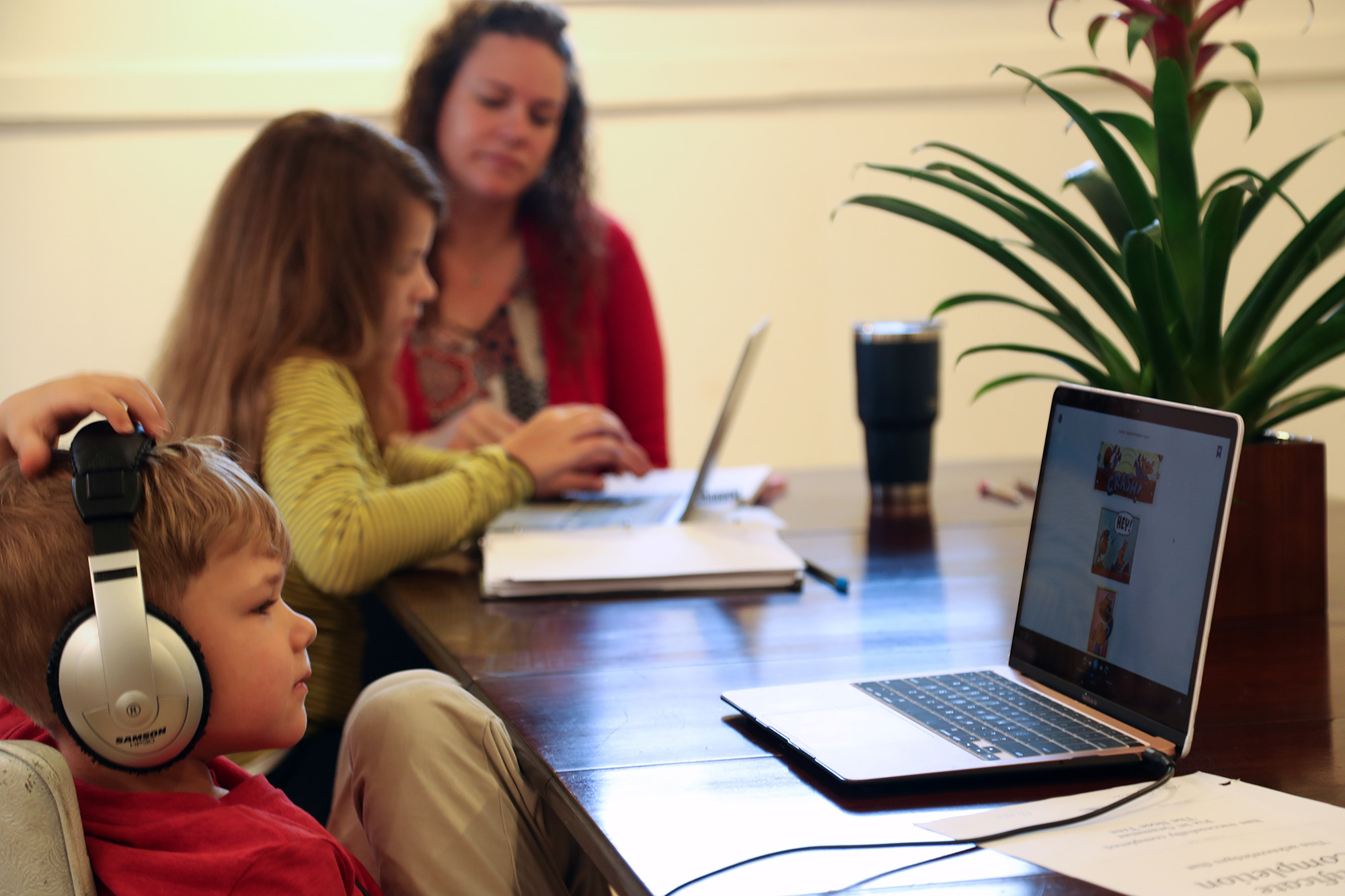
The Iowa Legislature passed a bill in 2020 that will make advanced education and training on dyslexia available to educators. The Iowa Reading Research Center at the University of Iowa will play a substantial role in the implementation of the legislation by offering a dyslexia specialist endorsement program. The first cohort of students will begin coursework in fall 2021.
Deborah Reed, director of the Iowa Reading Research Center, says the curriculum will include learning about assistive technology for reading.
“What we’re doing as a service right now for families hopefully will be more well known by educators working directly with kids every day in schools,” Reed says.
As for VanZuiden, the consultation at the IRRC didn’t only benefit her children. She also has taken advantage of the technology to assist her as she pursues a dyslexia specialist certificate through the University of Florida. After graduating in August, VanZuiden plans to enroll in Iowa’s new dyslexia specialist endorsement program, which starts this fall.
“I can get audiobooks of my textbooks, but when they would give us a PDF, I was stuck and would spend an exorbitant amount of time trying to read the material over and over to make sure I understood it,” VanZuiden says. “But one of the programs Karah showed us reads PDFs. And oh, my goodness, it has saved me so much time. It doesn’t teach me what I don’t know, but it gives me access to information in a way that I can absorb it.”
VanZuiden says she is grateful for services like that provided by the University of Iowa’s IRRC.
“We give kids who can’t see glasses, kids who can’t hear hearing aids, kids who can’t walk wheelchairs. But how are we supporting kids who struggle to read and write?” VanZuiden says. “It’s a huge sigh of relief as a parent to know that my children are supported and have the technology that they need to show the world what they know.”
